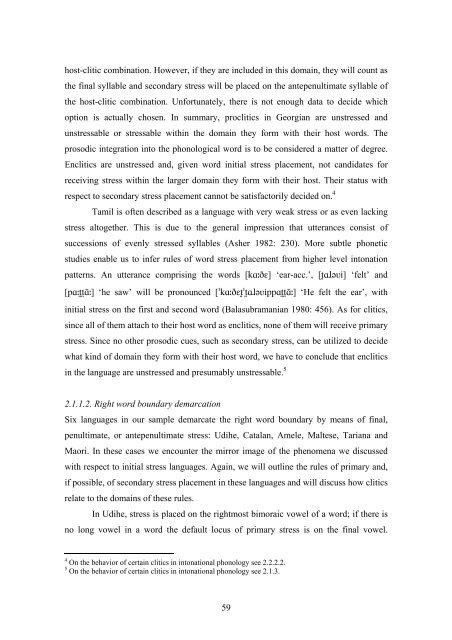View - KOPS - Universität Konstanz
View - KOPS - Universität Konstanz
View - KOPS - Universität Konstanz
You also want an ePaper? Increase the reach of your titles
YUMPU automatically turns print PDFs into web optimized ePapers that Google loves.
host-clitic combination. However, if they are included in this domain, they will count as<br />
the final syllable and secondary stress will be placed on the antepenultimate syllable of<br />
the host-clitic combination. Unfortunately, there is not enough data to decide which<br />
option is actually chosen. In summary, proclitics in Georgian are unstressed and<br />
unstressable or stressable within the domain they form with their host words. The<br />
prosodic integration into the phonological word is to be considered a matter of degree.<br />
Enclitics are unstressed and, given word initial stress placement, not candidates for<br />
receiving stress within the larger domain they form with their host. Their status with<br />
respect to secondary stress placement cannot be satisfactorily decided on. 4<br />
Tamil is often described as a language with very weak stress or as even lacking<br />
stress altogether. This is due to the general impression that utterances consist of<br />
successions of evenly stressed syllables (Asher 1982: 230). More subtle phonetic<br />
studies enable us to infer rules of word stress placement from higher level intonation<br />
patterns. An utterance comprising the words [k����] ‘ear-acc.’, [t�����i] ‘felt’ and<br />
[p��t�t����] ‘he saw’ will be pronounced [�k����t��t�����ipp�t�t����] ‘He felt the ear’, with<br />
initial stress on the first and second word (Balasubramanian 1980: 456). As for clitics,<br />
since all of them attach to their host word as enclitics, none of them will receive primary<br />
stress. Since no other prosodic cues, such as secondary stress, can be utilized to decide<br />
what kind of domain they form with their host word, we have to conclude that enclitics<br />
in the language are unstressed and presumably unstressable. 5<br />
2.1.1.2. Right word boundary demarcation<br />
Six languages in our sample demarcate the right word boundary by means of final,<br />
penultimate, or antepenultimate stress: Udihe, Catalan, Amele, Maltese, Tariana and<br />
Maori. In these cases we encounter the mirror image of the phenomena we discussed<br />
with respect to initial stress languages. Again, we will outline the rules of primary and,<br />
if possible, of secondary stress placement in these languages and will discuss how clitics<br />
relate to the domains of these rules.<br />
In Udihe, stress is placed on the rightmost bimoraic vowel of a word; if there is<br />
no long vowel in a word the default locus of primary stress is on the final vowel.<br />
4 On the behavior of certain clitics in intonational phonology see 2.2.2.2.<br />
5 On the behavior of certain clitics in intonational phonology see 2.1.3.<br />
59

















